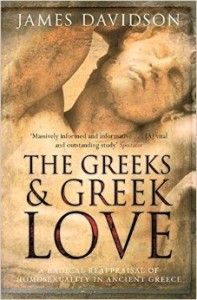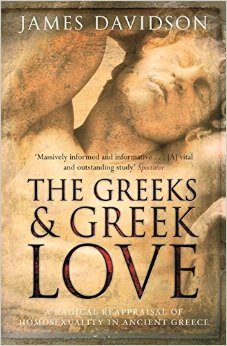 The Greeks and Greek Love: A Radical Reappraisal of Homo-sexuality in Ancient Greece
The Greeks and Greek Love: A Radical Reappraisal of Homo-sexuality in Ancient Greece
by James Davidson
Weidenfeld & Nicolson
656 pages, £30.
ANCIENT GREEK Homosexuality is an enigmatic subject. A few years ago in these pages (May-June 2004), Thomas K. Hubbard and Beert Verstraete described how K. J. Dover and Michel Foucault established the current paradigm by acknowledging the sexual aspect of the pederastic relationship and the prevalence of bisexuality in Greece. While both Dover and Foucault saw Greek homosexuality almost exclusively in terms of domination and submission, Hubbard offered evidence of couples of similar age and esteem having sex, while Verstraete pointed out that there was casual sex as well. Both called for a new synthesis to account for the diversity of the Greek reality.
James Davidson is famous for his fascinating study of Greek culinary pleasures (Courtesans and Fishcakes, 1998), and many scholars (including himself) expected him to provide the new paradigm on Greek homosexuality. Instead, he has refurbished a Victorian model: Greek love was not all about boys and sex; it was all about couples and romance.
Davidson’s style is enchanting, and he offers some dazzling new ideas. When interpreting gay myths, such as that of Ganymede, he invokes images like the resemblance of a certain stellar constellation to a spray of divine semen. Like William A. Percy (Pederasty and Pedagogy in Archaic Greece, 1996), he examines the circumstances in which same-sex relations were institutionalized in different parts of Greece, elaborating a detailed picture for each region, for example, the role of gay attachments in Spartan political intrigues.
Davidson tries to break the dominance of Dover and Foucault by tracing the origins of their ideas to their personal lives. This segment is a gripping piece of investigative journalism. But surely scholars’ ideas should be judged on their evidence and logic as well as psychological motives. Too often, Davidson’s own argumentation is questionable. He notes how “bizarre” it is that Plato pictures the soul as feminine, not telling the reader that “soul” is a feminine word in Greek. He and Dover both maintain that anal sex, which they regard as demeaning, was uncommon; so he argues from a single text that the term “wide-ass-holed” (euryproktos), previously taken to refer to habitual bottoms, really meant only “big-mouthed”; yet elsewhere Davidson himself cites texts in which it can only mean the former.
Transcending regional variations, there were two main types of gay relations in early Greece: an educational tradition leading to the educational pederasty idealized by Socrates, and an institutionalized military camaraderie. Davidson prefers the latter, where he sees officially sanctioned relations similar to the medieval same-sex partnerships studied by John Boswell.
The educational tradition began with lyric poets like Archilochos, who sounded themes like “make love, not war.” This radical reversal of heroic values has usually been regarded as a serious intellectual revolution; and the corresponding relationships, which involved training the boys in music and poetry as well as fighting, introduced the tradition that ancient as well as modern observers credit with Greece’s cultural achievements. Davidson deftly undermines the importance of this entire tradition by arguing that just because lyric poets wrote for symposiums, this was “off-duty” eros, not to be taken seriously. This intrusion of modern social values—the Greeks took their symposiums very seriously—downplays the most celebrated aspect of Greek love, however embarrassing for some academics, and enables Davidson to highlight what he regards as the more wholesome relations of his wedded warriors. He insists that the rituals sanctioning same-sex relations were not initiations of boys into adulthood, but instead weddings between older and young adults.
People obsessed with the bogeyman of “intergenerational sex” will be relieved to read that any action with men under eighteen was illegal. What’s odd here is that Davidson himself explains why the Greeks could not have had a rigid attitude on age. They didn’t record or celebrate birthdays, and boys were advanced to mature status based on physical examinations. These observations are innovative and profoundly important for any discussion of age. But then he insists, based on a controversial interpretation of an Athenian law, that a rigid line was drawn at age eighteen, and he hammers home the point by mistranslating the vague term for “boys” (paides) as “under-eighteens” and the word for “youths” (meirakia) as “over-eighteens.”
Dover’s desire to unveil crude sexuality responded to the sexual liberation of the 70’s. Davidson’s efforts to sanitize it suit more the conservative values of the present generation. At the same time, he reproduces many of Dover’s flaws. Both are amusingly preoccupied with the “problem” of anal sex. Both rely heavily on Plato and other controversial 4th-century BCE sources, ignoring later ancient sources and some important work by modern scholars. For example, Louis Crompton in Homosexuality and Civilization (2003) showed that legal proceedings tend to highlight the seedy side of sexuality, yet Davidson infers from such documents that Greek love suddenly and inexplicably became meretricious in the 4th century.
Kathy L. Gaca in The Making of Fornication: Eros, Ethics, and Political Reform in Greek Philosophy and Early Christianity (2003) reconstructed the practices of the early Stoics, who encouraged erotic teaching relationships with women as well as with boys. Strato of Sardis (2nd century CE) compiled an anthology of gay love poetry that included a practical solution for British scholars’ anxiety about anal sex: “Three on one bed … the one in the middle pleasures the guy behind and is pleasured by the one in front.” Davidson ignores these and other relevant modern and late ancient sources.
Davidson’s response to Foucault is even less satisfactory. Foucault’s hypothesis of general bisexuality in Greece is well documented, but there are many references to men who were attracted only to other males, which Foucault might dismiss as “essentialism.” Davidson fails to offer any reasoned analysis incorporating this conflicting evidence. He states casually that it’s unfortunate that the Greeks had no concept of sexual orientation, but when he imagines the sudden emergence of commercial sex in the 4th century, he announces that “a new kind of person-type previously not quite so noticeable, the homosexual, was coming out.”
Subtitled “a radical reappraisal,” this book, with its prominent author and opportunistic conclusions, is actually rather reactionary. Less flamboyant scholars will have to work for years to repair our understanding of Greek homosexuality.
James Jope, an independent classical scholar, maintains a website at jjope.blogspot.com.






